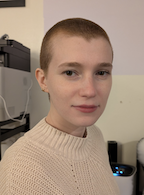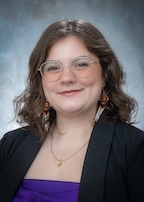Student Ambassadors
Speaking with a student ambassador is a great way to get a previous student’s perspective on the Language Schools experience.
If you would like to connect with a student ambassador to ask questions, please contact Laura Bachand, Portuguese School Assistant Director, at lbachand@middlebury.edu.
Madison Clark
Hometown: Montgomery, AL
Program: 7-week Immersion
Level: 1
Current: Associate Instructor, Survey of Black Culture in the United States, Indiana University
What surprised you about your experience at the Middlebury Language Schools?
I was surprised at how quickly I understood what was being spoken in Portuguese, despite my relatively little experience in the language!
Why did you choose to study at the Middlebury Language Schools?
I first learned about Middlebury when a new colleague at school heard about my research interest in Brazil. He recommended that I look into applying to Middlebury after his great experience from the immersion program and imagined I would be a good fit.
Please describe how your language skills improved due to your studies at Middlebury.
Before Middlebury, I was very hesitant in speaking in Portuguese. Now, I find myself speaking with more confidence and with more ease, without having to take as many breaks and pauses to find the right words and without second guessing myself. I find myself taking the initiative in starting conversations with my Portuguese speaking friends, and I’m understanding movies and music more and more without the aid of Portuguese closed captions to keep up with the audio.
Describe a typical day at Middlebury.
Normally, breakfast starts around 7am, and classes start around 8:30am. Lunch is near 1:30pm, and then an afternoon speaker and/class dialogue is around 5pm with dinner about 7:30pm or so. There are some scheduled activities depending on your interests, such as sports or poetry, or dancing, but you are free to study and schedule your study and homework when you aren’t required to attend your meals or lectures. Days can be pretty long, but it’s a good exhaustion when you lay in your bed at night.

Christina Manning
Hometown: Houston, TX
Program: 7-week Immersion
Level: 1S (Portuguese for Spanish Speakers)
Current: The University of Oregon, Romance languages
Why did you choose to study at our Portuguese School?
I was encouraged to enroll in the Portuguese School by my advisor, Dr. Lanie Millar, who had previously attended the Portuguese school herself. My current area of research is the literature surrounding the historical migration cycles between Italy and Latin America, including Brazil. I hoped to be able to include Portuguese-language texts in my research.
What surprised you about your experience at the Portuguese School?
I was shocked by how quickly my conversational Portuguese developed. I arrived in Bennington knowing only a few words and phrases, and without being able to conjugate a single verb. After a few days, I was able to converse about a variety of topics (The writing part came a while later). I was surprised by how tight-knit the community became after only the first few days. I personally spoke with most of the people at least briefly on a daily basis, and seeing each other for hours a day made us fast friends and fluid conversationalists.
Please describe how your language skills improved due to your studies at Middlebury.
I speak Spanish and Italian, so I was able to understand about 50% of what people were saying, but able to actually say next to nothing. During the first few weeks, my speaking ability improved significantly, but then started to slow down. During this time, I found it harder to speak because my growing understanding of the language made me more aware of my mistakes, but as I continued to speak with my peers and professors, I became less affected by this insecurity. Another aspect of the program that really helped my language learning was how we as students were exposed to many different professors throughout the day besides just our course instructors. Mealtimes, clubs and cultural events exposed me to different accents and conversations, and the professors were incredibly warm and welcoming.
Describe your typical day at the Portuguese School.
The clubs and activities varied from day to day-but here’s an example of a typical Thursday or “Quinta Feira”
7:45-8:15 Wake up and grab a coffee in the Refeitorio on the way to class
8:30-10:10 Professor Jean’s aula, where we focus on writing, conjugation, and sometimes polemica (Scandal)
10:10-10:30 break between aulas, get in coffee #2
10:30-12:10 Professor Rui’s aula, where we give presentations on war, music and ourselves
12:10-1:30 The hardest part of the day is waiting for lunch. I often will nap, snack, and engage in fofoca (gossip) on the lawn
1:30 to 2:20 Lunch
2:30-4:00 Free
4:00 tutoring in Ross Cafe, coffee #3
5:00 Choir rehearsal with Sidney and Olga (very popular)
6:30 music club with Sidney
7:30 Dinner
8:30-11:00 Go for a walk, chat in the lounge, homework for the next day, wind down for bed
This is my personal schedule; many people also fit in exercise and going to sleep earlier.
What is one of your favorite memories from your summer at the Portuguese School?
My favorite memory is dancing Quadrilha (Brazilian line dance) at the Festa Junina. Everybody dressed up with country-style clothes, and the dance moves were easy to learn and very fun (my favorite move was “kill the cobra”). Professor Regina’s enthusiasm was contagious and everyone danced late into the night.
What advice would you give someone wanting to attend the Portuguese School?
Do it! You have nothing to lose by attending the Language Schools. It seems like a big time commitment, but it will snap you out of your routine and push you to take risks and learn not only about other cultures but also about yourself. It sounds cliche, but the best part of learning a language is the ability to connect with others, and you just might accidentally make lifelong friends!
What are you up to now?
I am preparing for my qualifying exams, as well as gearing up for the return to campus and teaching the Italian 101 course! The first day of school makes me nervous as well, but I am also very excited to see students gain the confidence to speak Italian for the first time!

Chelsea Maxwell
Hometown: Broken Bow, OK
Program: 7-week Immersion
Level: 1.5
Current: Southeastern Oklahoma State University, Computer Information Systems and Political Science
What surprised you about your experience at the Middlebury Language Schools?
What surprised me the most about the Middlebury Language Schools was how helpful and open the professors and staff were. If I needed late-night homework help, a shoulder to cry on, or just someone to talk to, there was always someone I could turn to. Everybody there was rooting for my success, and that support truly helped me in learning Portuguese.
Why did you choose to study at the Middlebury Language Schools?
At first, I chose Middlebury because I was told that if I wanted to improve my Portuguese skills, it was the place to be. After doing my own research, I discovered why Middlebury was, and still is, the place to be: because it works! I spoke with people who had done the program and read about their experiences, and everyone said the same thing: I came out knowing a lot more than I came in with. There was also the appeal of being fully immersed in the Portuguese language and being taught by people whose first language is Portuguese.
Please describe how your language skills improved due to your studies at Middlebury.
Before Middlebury, when people asked how well I knew Portuguese, I would always say I knew about as much as a toddler just beginning to learn how to read. During the program, my skills in reading, writing, and speaking improved tenfold. I won’t say I’m now perfectly fluent, but I can confidently hold a conversation and read a book. This fluency was accomplished through the immersive and rigorous learning environment which Middlebury provides.
What makes the Portuguese School a unique place to learn the language?
The Portuguese School was a unique learning environment because of everyone’s commitment to the Portuguese language and the cultures attached to it. All of the students and professors were fully dedicated and wanted to get the most out of the experience. Every professor, whether they were your instructor or not, was there to help you, and if you were struggling or needed support, they gave their time and energy freely. The director of the Portuguese program would even reach out to check in on me, see if I needed help with my work, and encourage me to attend more events. Having such a diverse cohort, all committed to the language, also made it a welcoming and collaborative space where we could learn from one another.
Describe your typical day at Middlebury.
My typical day at Middlebury started around seven in the morning, as I fought off the grogginess from the previous day’s activities and hurried to get ready for breakfast. People always say breakfast is the most important meal of the day, and that’s especially true at Middlebury. Every meal was eaten together with the Portuguese School, and breakfast helped my brain switch from sleepy mode to learning mode, speaking and using Portuguese for everything.
After breakfast came our first class: grammar. In grammar class, we learned new grammatical rules, vocabulary, and practiced listening and reading comprehension. Then we had a fifteen-minute break before our second class: cultural studies. Each week focused on a different topic related to Lusophone cultures around the world. Some memorable projects included creating our own Turma da Mônica characters and designing our own carnaval bloco, which we marched through the cafeteria while singing.
After class, it was time for lunch, where everyone excitedly discussed what we had learned while trying to use our new language skills.
Afterward came a small break, which I often spent enjoying Vermont’s gorgeous scenery. Then came the clubs. The Portuguese School offered so many clubs and opportunities to practice Portuguese, each one letting us build language skills and connect with our peers. I personally participated in the podcast club, reading club, cooking club, and theater club.
Throughout the week, we also had special events: weekly lectures, movie nights, festivals, hangouts, art classes, performances, and more. After the day’s activities, I would sit down to work on my homework and eventually wind down to sleep, just to do it all over again the next day.
If you’ve had other language learning opportunities, how would you compare them to your experience at Middlebury?
Before Middlebury, I participated in another immersive Portuguese language program, the Critical Language Scholarship (CLS), held in Rio de Janeiro, Brazil. These programs are similar in many ways, with the major difference being location. While I would never trade my time in Rio, I learned much more at Middlebury. CLS is a wonderful program, but not everyone followed the language pledge, and at times it felt like I wasn’t making real progress. At Middlebury, the language pledge was taken very seriously, and I could see my improvement every day. CLS was more of a “go out and explore” experience, while Middlebury focused on group activities and building a sense of community within the cohort.
What advice would you give someone wanting to attend the School of Portuguese?
The one piece of advice I would give is: even if you think you can’t do it, you can! I won’t sugarcoat it: this program is challenging, and you won’t breeze through it. But it’s worth it. The experience and knowledge you gain make every moment of hard work worthwhile.
How has Middlebury helped you other than with language acquisition?
When I first arrived at Middlebury, I thought I was just there to learn Portuguese, but I was completely wrong. Don’t get me wrong, I made amazing strides in my language skills, but I also grew personally. I built lifelong connections, both professional and personal, that will help me in my future career. Middlebury also helped me realize how much I’m capable of. Because of this experience, I know I can and will achieve my dream of becoming a lawyer for my tribe, the Choctaw Nation of Oklahoma.
What is a memory from the School of Portuguese you will not forget?
There are so many memories I’ll never forget. Sitting late at night on the front lawn with my entire cohort, talking and watching the stars. Teaching my classmates how to make fry bread during cooking class, while learning Indigenous recipes. Performing a play we had thrown together the night before and receiving a standing ovation. Sharing joy and laughter during meals, classes, or even in the dorm common room. This program was hard work, and there were moments I just wanted it to be over, but I gained so much. Sure, I left with stronger Portuguese skills, but more importantly, I left with unforgettable memories that I’ll carry with me forever.

Ruth (Mary) Cohen Reyes
Hometown: Ashland, OR
Program: 7-week Immersion
Level: 1S (Portuguese for Spanish Speakers)
Current: Vocalist and Spanish teacher
Why did you choose to study at our Portuguese School?
I had been dreaming of attending Middlebury since my undergraduate studies 20 years ago. I heard it was the most prestigious language school in the US, and I chose Portuguese because I use the language in my artistic career as a vocalist in a Brazilian band and in my Bossa Nova trio. I have been working with the language but understanding only 60% and I wanted to achieve a level of fluency to be able to converse and understand what I am singing.
What surprised you about your experience at the Portuguese School?
I was not expecting to make beautiful connections with Brazilian musicians and be able to play with them. I was not expecting such a tight knit community as our school quickly became. I was not expecting to desire to maintain those connections. I had the best professors, the best colleagues. I have never laughed so hard, every day for 7 weeks in any other period of my life. It was therapeutic. Also, the opportunity to get back into a more athletic lifestyle, I was able to play tennis and volleyball which I hadn’t had the chance to do in years— as a mother and full time teacher. It reminded me that I need to take care of myself more in that respect.
Please describe how your language skills improved due to your studies at Middlebury.
Within a week I already had the tools I needed to be able to construct sentences and from there I was able to build as I acquired new verbs and tenses. I was able to detect and correct mistakes carried over from Spanish, increase my vocabulary and gain confidence to just speak. By the end, I couldn’t imagine my life without Portuguese. It is true when they say, when it is over, you don’t want to go back to English.
Describe your typical day at the Portuguese School.
Breakfast- waking each other up and confessing we still had not finished all of our homework. Amazing classes filled with love and laughter and the best kind of learning. Lunch - I looked forward to meals always because we all became such good friends and support for one another. Club activities- Choir and History of Brasilian Music with the illustrious Sidney Molina— THE BEST!!! Capoeira just about killed me, but I have so much respect for it now. Dinner and then time to study.
What is one of your favorite memories from your summer at the Portuguese School?
I have several. The marathon of the Brasilian Netflix Series Cidade Invisivel with my classmates! It was a bonding experience! My professor threatening to throw us out the window if we spoke another word of Spanish accidentally! He did that regularly— you know who you are! I loved our classes, I loved our big laughs over dinner on the veranda. Beating the Italians in volleyball.
What advice would you give someone wanting to attend the Portuguese School?
Come with an open mind, know that you can have a real family type experience here. Remember that we beat the Italian School & the Arabic School in the volleyball tournaments. It’s our legacy to uphold.
What are you up to now?
I am a Spanish teacher for grades 1-8th in Southern Oregon. I am hoping to take the FSOT with the State Dept whenever it opens up again to become a diplomat. I am performing in Portuguese and will be performing in Brasil next year—thanks to Middlebury!!

Mary Sturgis
Hometown: Shreveport, LA
Program: 7-week Immersion
Level: 1.5
Current: Georgetown University, Master of Science in Foreign Service
Why did you choose to study at the Middlebury Language Schools?
I had studied at the Middlebury French School in 2014 and knew that there was no better place to study a language. The immersion environment at Middlebury not only accelerates your language learning but also gives you the cultural competencies to use your skills confidently with native speakers long after the program ends.
What surprised you about your experience at the Middlebury Language Schools?
At about week three, I realized I was forming sentences and using vocabulary that I hadn’t studied from my textbook. Instead, I had absorbed what my peers were learning. Because of the immersion environment, I wasn’t limited to what my professor had taught me to say, but by how willing I was to take risks and try to imitate those around me. Now that I’ve left the Portuguese school, I find myself thinking “where did I learn that word?” or “I’m not sure why you say it that way, but I know it’s correct.” It’s an amazing feeling and speaks to the power of the Language Pledge to go beyond the classroom: it allows you to truly internalize the language.
Please describe how your language skills improved due to your studies at Middlebury.
I had never learned Portuguese before but knew that learning the language was the right next step for me, professionally and personally. When I decided it was time to learn Portuguese, I knew that I wanted a program that was tailored to the specific needs of Spanish speakers. I wasn’t disappointed! Over the course of the summer, I went from no Portuguese to Advanced-Low Portuguese in 7 weeks because of the dedication of my professors and peers in and outside of the classroom. As a student and future practitioner of International Relations, the diplomats, writers, and professionals who came to teach at Middlebury as guest professors were exceptional resources for me and allowed me to develop sector-specific vocabulary.
What advice would you give someone wanting to attend the School of Portuguese?
Be open to taking risks! Everyone at the language schools wants you to succeed. Lean into your limitations and push back when you think you can’t do something. Your brain is wired to communicate. Give it a chance to adapt to your new environment! Pretty soon, it’ll feel more like fun than hard work.
